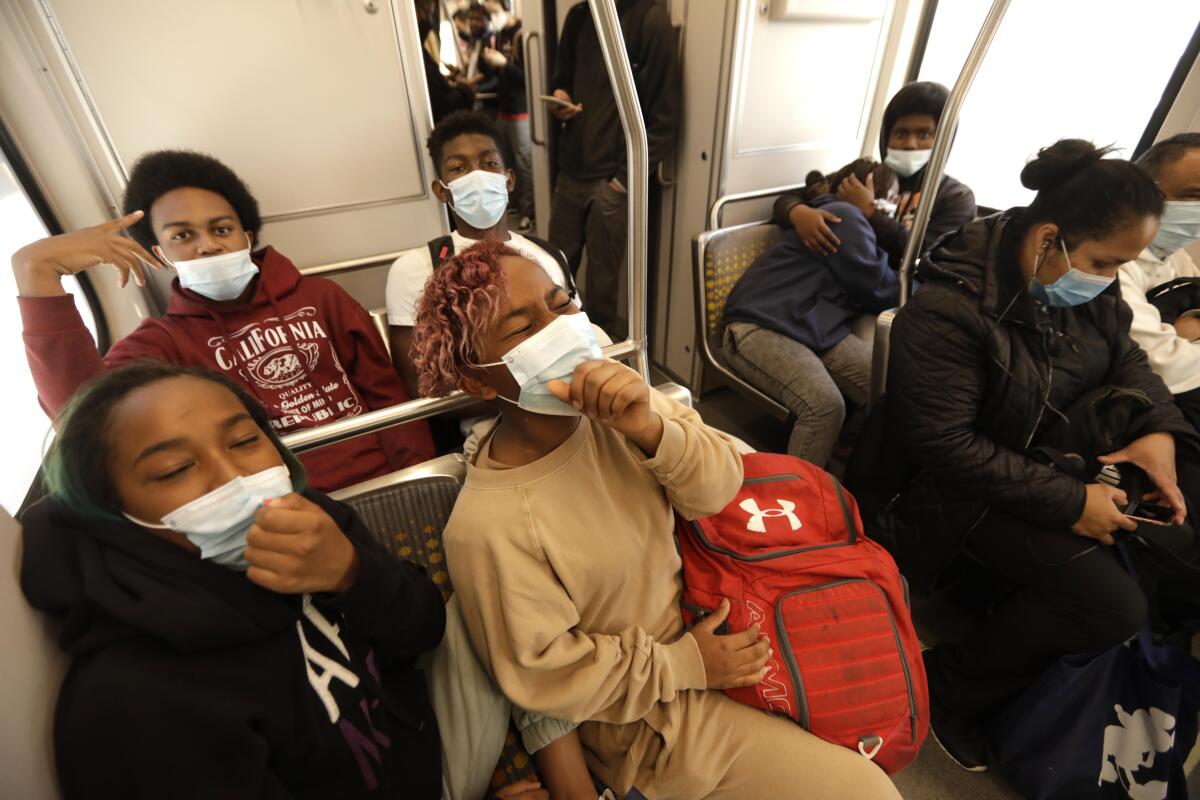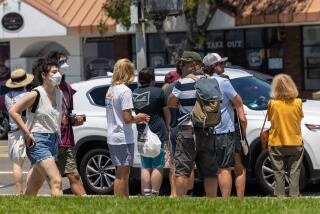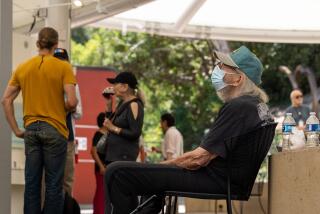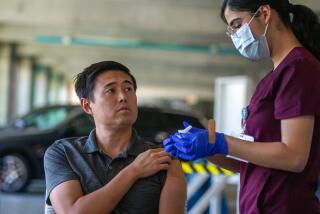‘Significant uptick’ in California coronavirus outbreaks brings new warnings

SAN FRANCISCO — Coronavirus conditions are likely to worsen, with case rates continuing to rise and hospitalizations starting to increase, according to the top health official in the San Francisco Bay Area’s most populous county.
“We are also seeing a pretty significant uptick in reports of outbreaks, from schools, work sites and other congregate facilities,” Dr. Sara Cody, the Santa Clara County public health director and health officer, said at a news conference Tuesday. “Many of them are related to social gatherings. It’s spring — school is ending and people are gathering, and COVID is spreading.”
Caution is especially needed as it’s becoming clear that the latest Omicron subvariants that are circulating can reinfect people who survived the first strains of the Omicron variant back in December or January. Experts had said that the first Omicron subvariant, BA.1, likely conferred immunity against a newer subvariant, BA.2.
But some experts say that surviving BA.1 may not confer a high likelihood of avoiding infection with an even newer subvariant, BA.2.12.1, which is more infectious than BA.2.
“Even if you got Omicron during the Omicron surge, you can still get COVID again, unfortunately,” Cody said.
She urged that unvaccinated people get vaccinated, get boosted if eligible, wear masks in indoor public settings, get tested if you think you’ve been exposed or develop illness, and gather outdoors, or, if indoors, open the windows or otherwise increase ventilation.
The Bay Area has the highest coronavirus case rate in California, nearly twice as high as Southern California. The trends here could offer an early warning to other parts of the state, as has been the case earlier in the pandemic.
“What we’re seeing now is similar to what we were seeing in mid-February, and it’s more than what we were seeing at the height of the Delta surge” from last summer, Cody said. “And we’re just beginning to see some early signs yet that this may be translating to an uptick in hospitalizations.”
In Santa Clara County, the home of Silicon Valley, coronavirus cases have tripled in the past month, from a rate of about 80 cases a week for every 100,000 residents to a rate of 227 cases a week for every 100,000 residents. That exceeds last summer Delta surge’s maximum of 203 cases a week for every 100,000 residents.
A rate of 100 or more is considered a high rate of transmission, the worst category as defined by the U.S. Centers for Disease Control and Prevention.
California has seen its coronavirus case rate climb to about 8,000 cases a day over the past week, up 18% from the prior week’s average of 6,800 cases a day. It’s the highest case rate since the end of February, as California was easing out of the first Omicron surge, but unlike Santa Clara County, the state has not exceeded last summer’s Delta peak. On a per capita basis, California as of Monday was reporting 144 cases a week for every 100,000 residents.
The Bay Area’s case rate was significantly higher than the statewide overall rate. The Bay Area had a case rate of 226 weekly coronavirus cases for every 100,000 residents, up 14% over the prior week.
Coronavirus-positive hospitalizations statewide are up by 10% over the past week, from 1,093 to 1,203. In Santa Clara County, coronavirus-positive hospitalizations have been trending upward in recent days, and are up by 7% over the past week, from 103 to 110.
Cody urged residents to take precautions to avoid infection.
“Even though these new variants spread so quickly, and it’s getting increasingly difficult because of that to prevent infection, it’s still worth preventing infection. That’s because if you’re sick, you’re gonna miss work, you’re gonna miss school, you might expose somebody else who’s not going to do well with COVID,” Cody said.
“And if you get sick with COVID, you’re at risk of long COVID, which you really don’t want to get,” Cody said. “So while it’s difficult, I still want to emphasize that trying to prevent it in the first place is still a good idea.”
Los Angeles County’s coronavirus case rate is also climbing.
According to data posted Tuesday, L.A. County was averaging about 2,554 coronavirus cases a day over the past week, up from 2,054 a day for the prior week, a 24% increase. L.A. County’s case rate was 177 cases a week for every 100,000 residents.
L.A. County’s hospitalizations have been fluctuating between about 210 and 270 coronavirus-positive hospitalizations over the past month.
“To date, the increases in case numbers have not translated to increases in severe illness, with hospitalizations and deaths remaining low and decreasing,” the L.A. County Department of Public Health said in a statement Monday. “The lower numbers of hospitalizations and deaths reflect, in large part, the protection provided by the vaccines against the variants.”
L.A. County Public Health Director Barbara Ferrer, however, cautioned residents to continue taking precautions in light of a high rate of coronavirus transmission.
“This month, there will be many opportunities for gatherings, including graduations, proms, and the upcoming Memorial Day holidays,” Ferrer said in a statement.
“For these occasions to not contribute to the increasing spread of Omicron variants, we encourage attendees to take sensible precautions that will protect you and those around you, including staying outside as much as possible and wearing a mask when indoors,” Ferrer said.
It’s also prudent to undertake rapid coronavirus tests before gathering, Ferrer said, “given the high number of asymptomatic individuals that are infected.”
“Most importantly, those who are older and those who have underlying health conditions should be sure to get boosted as soon as eligible to maximize protection from these highly infectious, mutated variants of concern,” Ferrer added.
More to Read
Sign up for Essential California
The most important California stories and recommendations in your inbox every morning.
You may occasionally receive promotional content from the Los Angeles Times.










